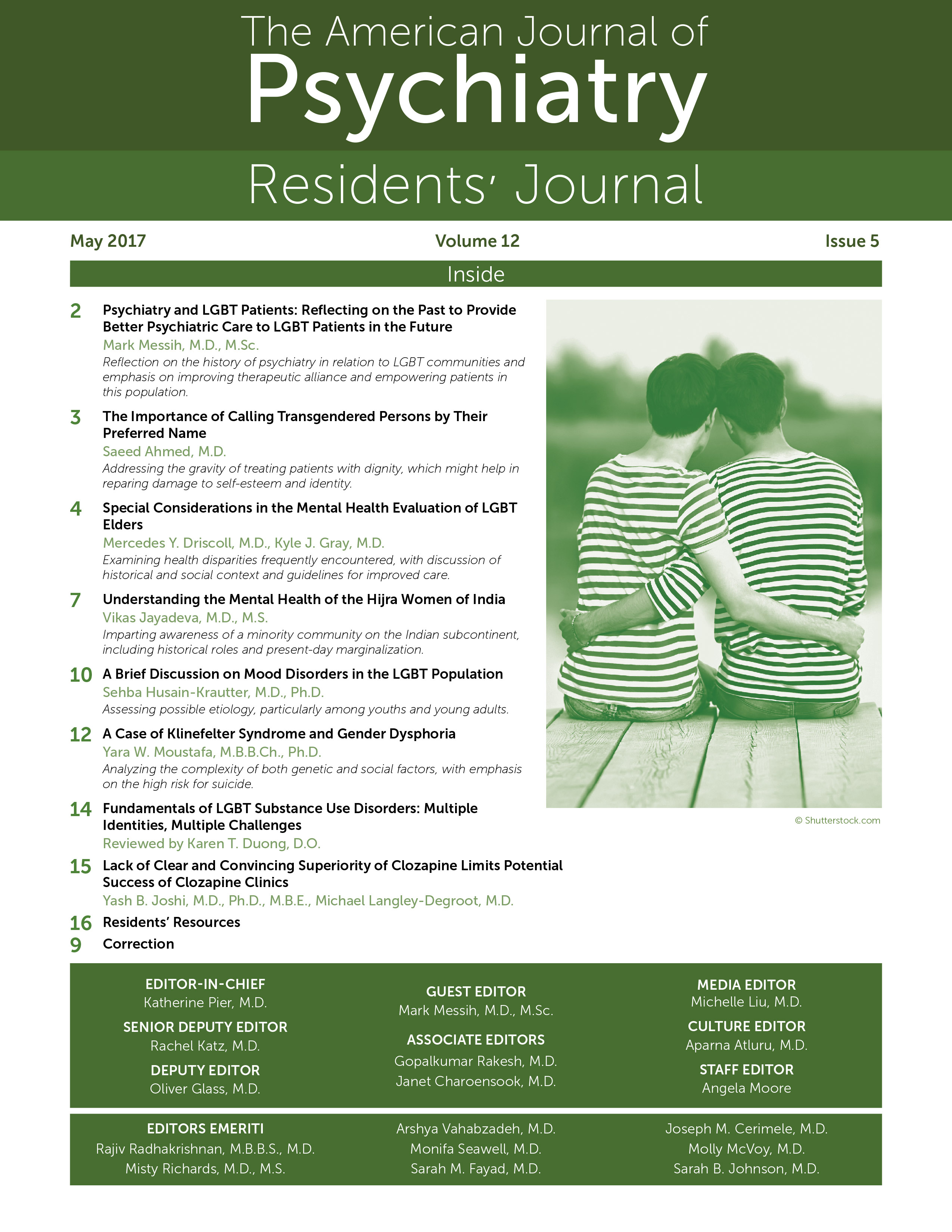Lack of Clear and Convincing Superiority of Clozapine Limits Potential Success of Clozapine Clinics
To the Editor: We read the commentary by Drs. Hughes and Singh (1) in the July 2016 issue of the Residents’ Journal with great interest, in which the authors pointed out the low rate of clozapine usage among psychiatrists, as well as the need to create more clozapine clinics in order to bolster trainee familiarity with this medication, thereby lowering the barrier to prescribe it in their future practice. Undoubtedly, such clinics would offer many boons to residency training, but this must be balanced with clozapine’s documented clinical effectiveness.
We take issue with the statement that there is “consistent evidence of superior efficacy, improved outcomes, and improved morbidity.” Indeed, a recent network meta-analysis by Samara and colleagues (2) assessing randomized controlled trials (RCT) of clozapine showed little evidence to justify that clozapine ought to be used with more frequency in treatment-resistant schizophrenia when considering its monitoring demands and adverse side effects (2). There is open controversy about how to weigh more recent RCTs and data (such as the work by Samara and colleagues) with the original study by Kane and colleagues (3) and other open-label trials demonstrating clozapine’s superiority. As Kane and Correll (4) point out, the label of “treatment resistance” appears to be applied with significant variability since their initial published article, making direct comparisons difficult between trials. Much of the evidence of clozapine’s superiority in treatment-refractory schizophrenia comes from open-label studies that were excluded from consideration in the meta-analysis by Samara and colleagues (5). It is unclear whether clozapine patients who are able to complete the more rigorous, blinded RCTs considered in this meta-analysis are generalizable to the broader population of treatment-refractory patients typically on clozapine and who tend to experience greater severity of symptoms and functional deficits. Nevertheless, it must be pointed out that even Kane and Correll (4) have remarked how it is very surprising that after 25 years following their seminal work, controversy still remains over clozapine. Residents should be aware of all of these studies as they initiate and follow-up patients on clozapine.
With all of that said, there is no doubt that in the right context and patient, clozapine can induce profound clinical improvement. In line with the general view of Drs. Hughes and Singh, we agree categorically that no resident’s training is complete without exposure to clozapine initiation and follow-up management. If at all possible, this should not wait until the second or third year of training when most programs have the majority of their outpatient clinic experience, and it ought to be in-folded early in the PGY-1 or PGY-2 experience. We believe that this approach would be more effective than a push for increase in the total numbers of clozapine clinics.
1. : Clozapine clinic: the need of the hour. Am J Res J 2016; 11:3 Abstract, Google Scholar
2. : Efficacy, acceptability, and tolerability of antipsychotics in treatment-resistant schizophrenia: a network meta-analysis. JAMA Psychiatry 2016; 73:199–210 Crossref, Google Scholar
3. : Clozapine for the treatment-resistant schizophrenic. A double-blind comparison with chlorpromazine. Arch Gen Psychiatry 1988; 45:78–796 Crossref, Google Scholar
4. : The role of clozapine in treatment-resistant schizophrenia. JAMA Psychiatry 2016; 73:187–188 Crossref, Google Scholar
5. ;



